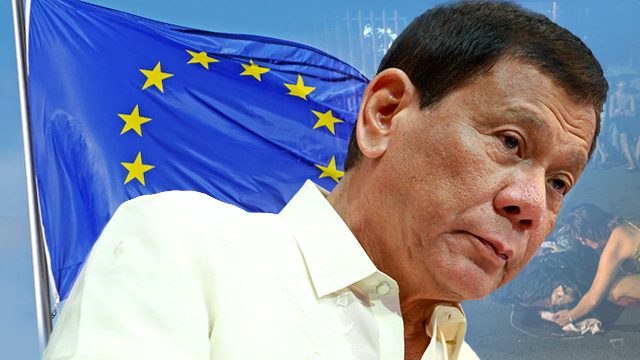SUMMARY
This is AI generated summarization, which may have errors. For context, always refer to the full article.

MANILA, Philippines – While human rights violations have existed in previous administrations, the situation in the Philippines has “considerably worsened” in the second half of 2016 as a consequence of President Rodrigo Duterte’s violent war on drugs, the European Union (EU) noted.
“The second half of the year was marked by a serious deterioration in respect for the right to life, due process, and the rule of law,” the EU stated in its annual report entitled “Annual Report on Human Rights and Democracy in the World in 2016” published on October 16.
Duterte’s campaign against illegal drugs have been widely criticized due to the rising number of killings. Data from the Philippine National Police (PNP) show at least 3,850 people have been killed in police operations while at least 2,290 others were killed mostly by vigilantes.
The government, however, consistently denies the existence of extrajudicial killings in the Philippines – even rejecting calls made by United Nations member-states for in-depth and impartial probes.
For EU, however, the Duterte’s rhetoric against individuals involved in illegal drugs contributed to the killings the country has been burdened with. (READ: Shoot to kill? Duterte’s statements on killing drug users)
“The president’s statements and actions have seemingly encouraged the police to take an aggressive approach in dealing with drug users and pushers,” it said.
Follow the law
The report also listed the “new momentum” in the peace process in Mindanao, peace negotations with the Communist Part of the Philippines, and socio-economic policies against poverty as “positive developments” under Duterte.
These developments, however, have been stalled, particularly the peace negotiations. (READ: Duterte still open to peace talks with communists)
But the “one major problem” in the country, according to EU, was the prevailing culture of impunity as killings and human rights abuses remained unresolved. This included attacks against human rights defenders and journalists as Duterte remained consistent with his tirades. (READ: ‘Demonizing’ human rights in the first year of Duterte)
The EU, however, reminded the Duterte administration to follow the rule of law in its campaign against illegal drugs.
“The government needs to ensure that the fight against drugs and crime is conducted within the law, including the right to due process and safeguarding of the basic human rights of citizens of the Philippines, including the right to life, and that it respects the proportionality principle,” it said.
“This naturally includes the rights of human rights defenders,” the EU added.
The report was released less than a week before Foreign Secretary Alan Peter Cayetano confirmed to the media that the Philippine government is rejecting all kinds of grants from the EU because of conditions that were supposedly being used to criticize the government.
The rejection has been long coming as Duterte himself had talked about refusing EU aid in the first few months of his administration as the EU expressed concern in his war on drugs. (READ: How important is the EU to the Philippines?) – Rappler.com
Add a comment
How does this make you feel?





There are no comments yet. Add your comment to start the conversation.